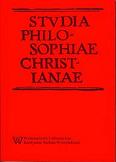Pojęcie przesądu w filozofii krytycznej Kanta i fenomenologii Husserla
The concept of prejudice in Kant’s critical philosophy and Husserl’s phenomenology
Author(s): Piotr ŁaciakSubject(s): Philosophy, Epistemology, Early Modern Philosophy
Published by: Wydawnictwo Naukowe Uniwersytetu Kardynała Stefana Wyszyńskiego w Warszawie
Keywords: Kant; Husserl Edmund; Gadamer; prejudice; pre-judgment; provisional judgment; pre-knowledge
Summary/Abstract: This article examines the concept of prejudice (Vorurteil) in Kant’s and Husserl’s theories. According to Kant, prejudices must be distinguished from provisional judgments that may be called anticipations or maxims for all inquiry. We form a provisional judgment (vorläufiges Urteil) of a thing before we recognize it with definitive judgment (bestimmendes Urteil). Prejudices, by contrast, are provisional judgments (or opinions) wrongly taken as definitive judgments, namely judgments which are adopted as principles without research of the conditions of their truth. Thus, Kant’s notion of prejudice has the negative connotations and the aim of the critical philosophy is to overcome all prejudices. In contrast to Kant, Husserl makes distinction between positive and negative prejudices: positive prejudice is understood as a pre-judgment (Vor-Urteil) in the form of presumptive pre-knowledge (Vorwissen) and corresponds to Kant’s concept of anticipation belonging to provisional judgment, while objectivistic (naturalistic) naïveté appears to be negative prejudice. The aim of phenomenology is to suspend all prejudices and this suspension makes it possible to research of their origins. In the article author shows that Husserl’s conception of prejudice as a pre-judgment is similar to Gadamer’s rehabilitation of prejudice as a pre-understanding. Therefore, it is possible to indicate similarities between Kant’s concept of provisional judgment, Husserl’s idea of pre-knowledge and Gadamer’s conception of pre-understanding.
Journal: Studia Philosophiae Christianae
- Issue Year: 51/2015
- Issue No: 4
- Page Range: 123-149
- Page Count: 27
- Language: Polish

